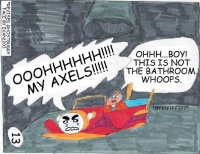Difference between revisions of "Template:Article of the now"
| Line 1: | Line 1: | ||
<div style="float:left;margin-right:0.9em"> | <div style="float:left;margin-right:0.9em"> | ||
[[Image: | [[Image:Notthebathroom.jpg|200px|left|LET'S GO GHOSTBUSTERS, LET'S GO!]] | ||
A parody is defined as a literary or musical work in which the style of the author or work is closely imitated for comic effect or in ridicule. The concept dates back to Ancient Greek literature, as Hegemon of Thasos was credited with being the first guy to change the words of poems to make them funny. | |||
('''[[ | In a broader sense, parodies need not be humorous as long as they provide some sort of commentary on the original work. In that sense, a parody can be considered a sort of critical analysis of the original work. | ||
For [[Christian Weston Chandler]], the word "parody" is basically a way to secure copyrights for other people's ideas. You see, parody falls under "fair use" in copyright law, so if [[Sonichu (character)|Sonichu]] is a <i>parody</i> of [[Sonic the Hedgehog]] and [[Pokemon]], then it's perfectly legal for Chris to turn Sonichu into a multimedia empire. | |||
('''[[Parody|more...]]''') | |||
<noinclude>[[Category: Front page templates]]</noinclude> | <noinclude>[[Category: Front page templates]]</noinclude> | ||
Revision as of 15:52, 2 May 2009
A parody is defined as a literary or musical work in which the style of the author or work is closely imitated for comic effect or in ridicule. The concept dates back to Ancient Greek literature, as Hegemon of Thasos was credited with being the first guy to change the words of poems to make them funny.
In a broader sense, parodies need not be humorous as long as they provide some sort of commentary on the original work. In that sense, a parody can be considered a sort of critical analysis of the original work.
For Christian Weston Chandler, the word "parody" is basically a way to secure copyrights for other people's ideas. You see, parody falls under "fair use" in copyright law, so if Sonichu is a parody of Sonic the Hedgehog and Pokemon, then it's perfectly legal for Chris to turn Sonichu into a multimedia empire. (more...)
